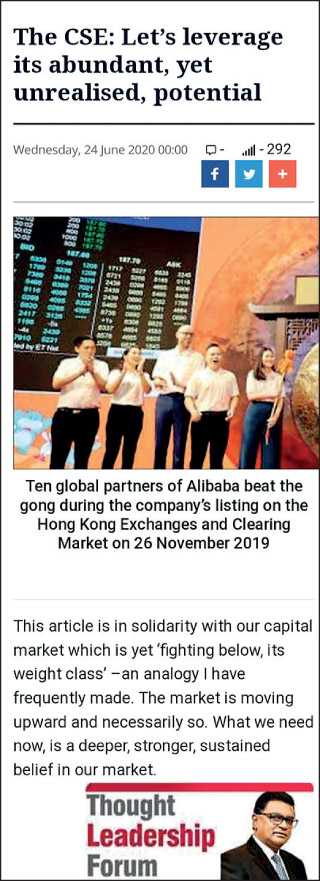Wednesday Feb 18, 2026
Wednesday Feb 18, 2026
Monday, 19 October 2020 00:00 - - {{hitsCtrl.values.hits}}
By Ranel Wijesinha
 I am truly delighted that the CSE is finally beginning to leverage its abundant yet unrealised potential as I said in my column, The Thought Leadership Forum, in the Daily FT in June (http://www.ft.lk/columns/The-CSE-Let-s-leverage-its-abundant-yet-unrealised-potential/4-702089).
I am truly delighted that the CSE is finally beginning to leverage its abundant yet unrealised potential as I said in my column, The Thought Leadership Forum, in the Daily FT in June (http://www.ft.lk/columns/The-CSE-Let-s-leverage-its-abundant-yet-unrealised-potential/4-702089).
CSE’s performance, too, is despite the yet uncontained COVID-19, with a second wave in many countries, and an impending second partial or full lockdown in Sri Lanka. I hope the latter will be avoided or overcome, and the resulting constraints to the wheels of commerce, business, exports, remittances, self-employment and much more will be minimised and mitigated.
If indeed this is the performance of the market against these odds, I wonder what it would have been if COVID-19 was completely behind us now, or if there was no indication of a second lockdown. We might then have said “You ain’t seen nothing yet”, borrowing from the words of US President Ronald Regan when he was complimented on certain achievements.
I would like to think that we haven’t seen the full potential of the Colombo Stock Exchange yet. There are many pending initiatives that the CSE and SEC have to engage in, as I articulated in that column in June. They and the broking community have to be the catalysts.
I believe this is a good time for the Government to do the part listings of the SOEs, which I have been pushing for since 2015. Might I add that corporates may consider coming to the market to finance balance sheet realignment and restructuring that became necessary as a result of the first phase of COVID-19, and initiate expansions and modernisations, through new issues and rights issues, to be in a state of readiness, to hit the ground running as it were, when we have put this horrendous coronavirus behind us, by 2021/22.
As for SOE part listings, it would only be fair by those institutions that need the financial autonomy, rather than be dependent on the Government, more so at a time when the Government has a compelling and indeed daunting need to restructure our national balance sheet.
The institutions I refer to are only just a few which need to leverage their own capability to expand their businesses, whether they are Bank of Ceylon, People’s Bank, Sri Lanka Insurance Corporation, etc. Their long-standing employees deserve to have tangible proprietary interest, as was done with so many institutions in the early 1990s – for example, the NDB, United Motors, etc.
I think the Government needs to demonstrate the political will to do so and the political opposition and progressive stakeholders, whether in business, the professions or civil society, should build a rationale for it and support it.